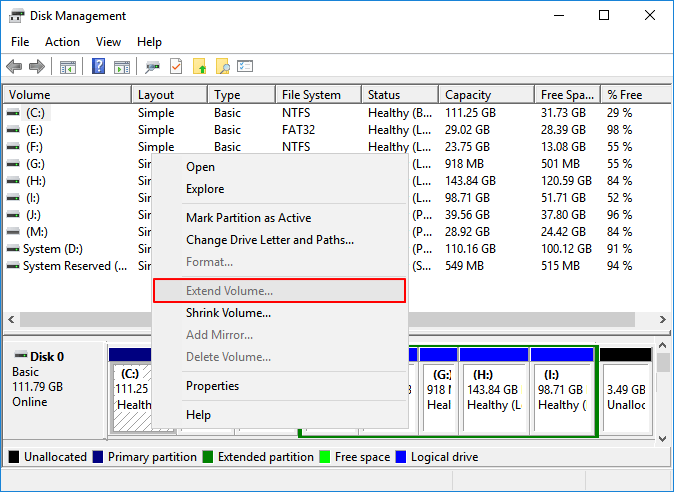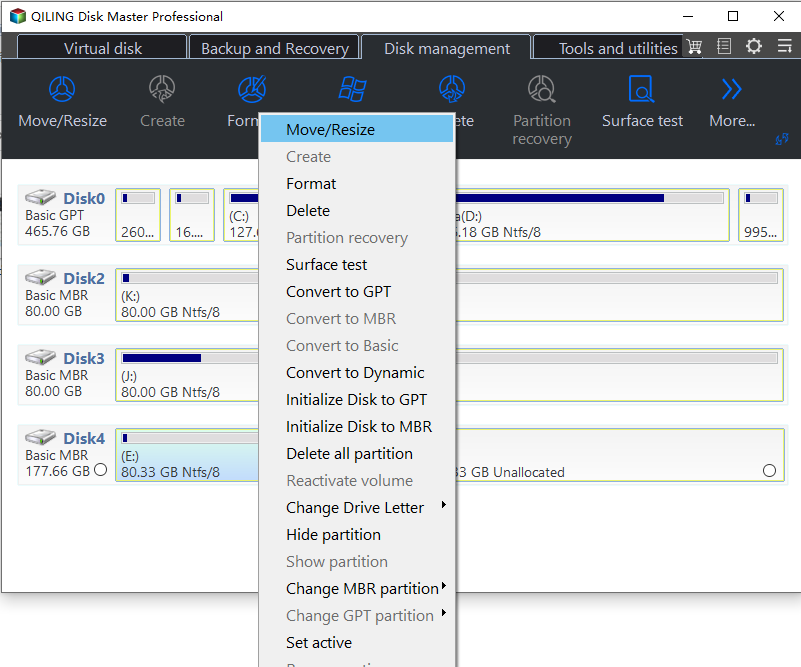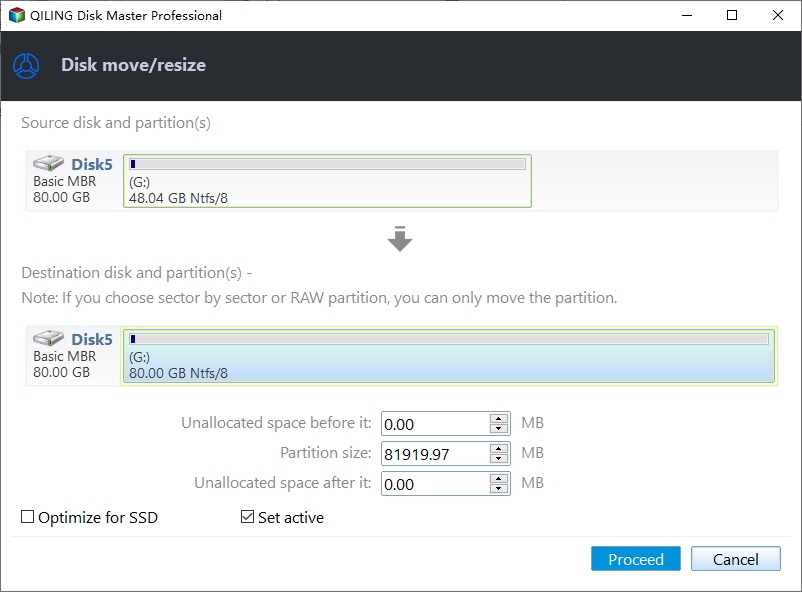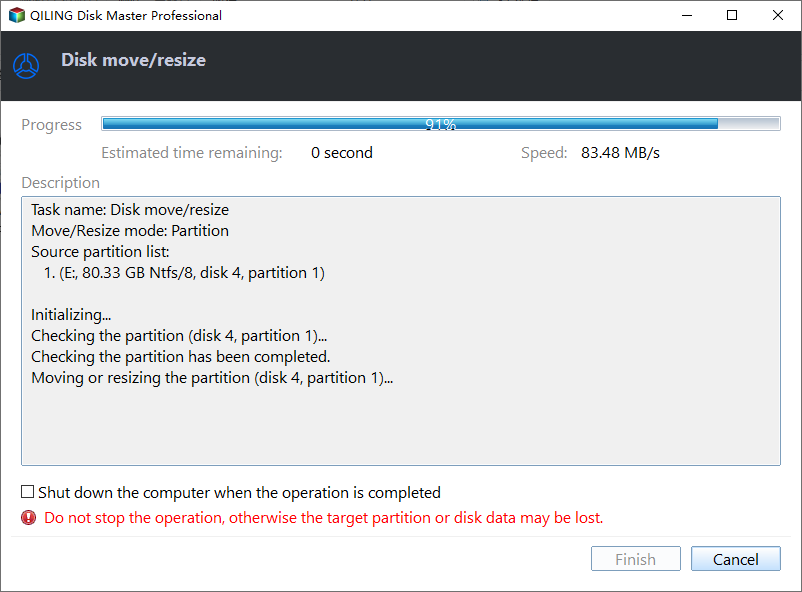How to Make Unallocated Space Contiguous [Step-by-Step Guide]
Unallocated space is space that has not been used and does not belong to any partition. It has programs to write data to the disk. And you may find that you have two or three unallocated spaces on your disk. So, making unallocated space contiguous can be an effective way to manage the lack of disk space. This article will give two ways to help you learn how to make unallocated space contiguous.

You may also like:
You can click the button below to know detailed information about managing unallocated space.
Can I Make Unallocated Space Contiguous in Disk Management
To make better use of the unallocated space, we need to make non-adjacent spaces contiguous. But Disk Management can't help us finish this operation.
Disk Management is a very useful tool provided by Windows. It makes it easy to resize partition without losing data. But when you try to make unallocated space contiguous, you will find that it can't operate in unallocated space. Disk Management cannot move unallocated space locations or merge unallocated space into contiguous or non-adjacent partitions on the right.
Besides, when you try to extend the C drive, you will find that the unallocated space can only be extended by the user to the D drive. Because the extended volume can only add unallocated space to the left contiguous partition. Shrink volume can only generate unallocated space on the right side.

- Notice:
- When you find that the extended volume grayed out, it could also be due to a variety of other reasons. You can click the link below to find a solution.
Extend Volume Greyed Out? Fix Can't Extend Volume in Windows [New]
When extend volume greyed out in Disk Management, you can't extend volume or C drive. Are you trying to extend volume or expand volume in Windows 11/10, 8, or 7? Relax!

In short, Disk Management cannot make unallocated space contiguous. Fortunately, you can use a professional third-party partition manager to accomplish the goal.
How to Make Unallocated Space Contiguous
We already know that Disk Management cannot do that to make unallocated space contiguous. I will recommend an amazing software: Qiling Disk Master, which makes up for the limitations of Windows tools. It is a powerful tool with a simple interface and easy-to-use steps. Let's see how it can make unallocated space contiguous.
Step 1. Select the partition next to the unallocated space, select "Resize/Move".

Step 2. Put the mouse on the partition and drag it to the left or right to move the unallocated space.

You can repeat Step 1 and 2 to move the unallocated space to the desired location.
Step 3. Click "Proceed", it will execute the operations to add the unallocated space into the target partition eventually.

What Else Can Qiling Disk Master Do?
With the above steps, we learned how to use Qiling Disk Master to make unallocated space contiguous. Qiling Disk Master is a good helper for disk management and supports Windows 11/10/8/7 and Windows XP. It can also Help us to solve more problems related to disk partitioning.
- Add unallocated space to the D drive
- Convert unallocated space to free space
- Convert MBR to GPT without losing data
- Create/delete/move/merge partitions
Bonus Tip: How to Use Unallocated Space Contiguous
After we make non-adjacent unallocated space contiguous, it's time to know how to use it. Usually, we use the unallocated space for two situations:
1. Use the unallocated space to extend the C drive
2. Create a new partition on the unallocated space
We already know that Disk Management has some limitations. But Qiling Disk Master can easily use the unallocated space to extend the C drive. Let's take a look at how it works to use the unallocated space to extend the partition.
Use Unallocated Space to Extend C drive
Qiling Disk Master can directly extend C drive with non-adjacent unallocated space. The "Move Partition" function makes this task very easy. Here are the specific steps on how to make unallocated space contiguous to the C drive
Step 1: Free up unallocated space for C drive.
If there is no unallocated space on the system disk, go to Partition Manager and right-click on a partition next to the C: drive and select "Resize/Move".
Drag left panel of the partition to shrink and leave unallocated space behind the system C: drive and click "OK".
Step 2: Increase C drive space.
1. Right-click on C: drive and select "Resize/Move".

2. Drag the system partition end into unallocated space so to add space to C: drive.

Step 3: Keep all changes to extend C: drive.
Click the "Proceed" to keep all changes so to extend the system C: drive.

Create a New Partition on Unallocated Space
After making the unallocated space contiguous you will get a larger unallocated space. In this space, you can create a partition and use it to store data. With Qiling Disk Master, you will know how to create partitions in just a few simple steps.
Step 1. Launch Qiling Disk Master. On the main window, right-click on the unallocated space on your hard drive or external storage device and select "Create".
Step 2. Adjust the partition size, file system (Choose the file system based on your need), label, etc. for the new partition.
Step 3. Click on the "Proceed" button to create a new partition.
Watch the following video tutorial and learn how to create a partition in NTFS, FAT, or EXT file system.
Conclusion
In this guide, we know that we cannot use Windows built-in tool Disk Management to make unallocated space contiguous to the C drive. But with Qiling Disk Master, we can meet our different needs for unallocated space.
In three simple steps, we can make the unallocated space contiguous. Once the unallocated space is contiguous, you can use the unallocated space wisely. Qiling Disk Master is a very reliable tool for creating new partitions.
FAQs About How to Make Unallocated Space Contiguous
This section will show three frequently asked questions and answers about unallocated space. Please read on if you are interested.
1. How do I make unallocated space usable?
You can make a new partition on unallocated space or use unallocated space to expand an existing partition. Qiling Disk Master can easily help you with using and allocating unallocated space. You can also use Disk Management to make unallocated space available.
Step 1. Hold down "Windows+R" to open the Run window and type "diskmgmt.msc".
Step 2. Right-click on the unallocated space you want to use and select "New Simple Volume."
Step 3. Follow the prompts to set the drive number, file system, and other settings.
2. Why do I have two unallocated spaces?
If your hard disk is larger than 2 TB and initialized to MBR, your disk may be divided into two unallocated spaces by Disk Management. If you want to merge unallocated space larger than 2TB, you need to convert MBR to GPT.
3. Can you remove the unallocated partition?
Since unallocated space does not belong to any partition, you cannot delete unallocated space. You can do this by creating a new partition on the unallocated partition or by moving the unallocated space into an existing partition. Both of these methods can remove unallocated partitions.
Related Articles
- SanDisk Format Solution: Format SanDisk to The Best Performance on Your Own
- Full Guide on USB Benchmark and Check Your USB Speed
- Format Tool for SD Card | Free Download 2023 Best Memory/SD Format Tool
- How to Format Bootable Pendrive/USB Flash Drive to Normal [3 Solutions]